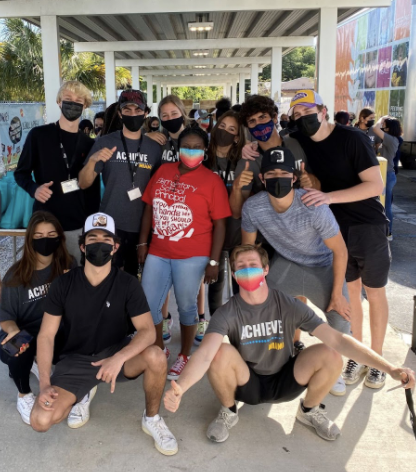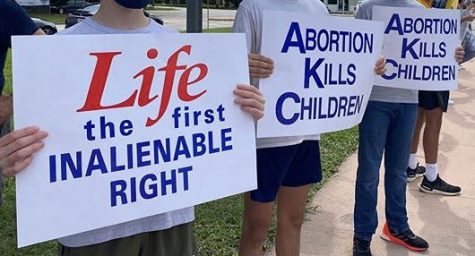Protecting the National Anthem- One Opinion

Oh say can you see how the mask of patriotism blinds.
The day after Columbus Day, a rather questionable holiday for its own reasons, the entire upper school was assembled into the new Center for the Arts to be informed of the school administration’s perceptions that it is disrespectful to kneel rather than stand during the National Anthem. According to Dr. John Davies, respect is demonstrated by “standing and facing the flag” upon the playing of the National Anthem.
As I walked into the auditorium, I immediately noticed the bright blue electric guitar and amplifier sitting on the stage. Soon after, I realized that, unlike any other assembly, the event would commence with the playing of the National Anthem. After being requested to stand for the pledge, I recognized the rendition of The Star-Spangled Banner being played. I would later be reminded that the version originated from Jimi Hendrix at his 1969 Woodstock performance. Notably, Hendrix’ version was seen as unpatriotic at the time and was considered a protest against the Vietnam War. Almost 50 years ago, critics cited the African American musician as disrespectful because of his rendition and even labeled him anti-American.
After the reverberations of the guitar strings turned to silence, Dr. Davies picked up the microphone and introduced the assembly’s topic: “Respectful Procedure for the National Anthem.” Following an introduction, Dr. Davies requested that “when the National Anthem is played at Miami Country Day School, you stand and face the flag”. He clearly stated that this was a request and not a prohibition. However, he did note that his request is expected to be followed.
Dr. Davies reasoned that the National Anthem was not an appropriate time for protest and, while he says he encourages students to use their First Amendment right, he wants to ensure that we retain our core values. While this ideal is honorable, it is unrealistic. There is never an “appropriate” time for protest. Protests are designed to make people feel uncomfortable and any alteration to make a protest acceptable for society’s norms dilutes the potency and effectiveness of true protest. The notion that peaceful protests are some easily agreeable topic is far from accurate and stems from misconceptions of the Civil Right’s Movement. As Ta-Nehisi Coates has recently noted, pivotal historic events such as the March on Washington and Montgomery Bus Boycotts were highly unfavorable during the sixties and the majority of people had a negative opinion of Dr. Martin Luther King. Similarly, Dr. Davies argument that this form of protest should be avoided because of its controversy directly contradicts the experience of social change in this country.–
Instead of sitting during the National Anthem, Dr. Davies suggests that the student body participate in community talks about racial injustice in this country. While he noted that “he looks forward to participating in conversations”, I am left wondering how accessible he truly is. While he did attend the meeting on Thursday, he did not make any comments and left before the meeting was over. Moreover, I struggle to comprehend what platform is “appropriate” for an open and respectful debate where minority voices can be heard without fearing a majority group’s backlash. Two posts on the topic of kneeling during the National Anthem were deleted from the Student Government page minutes after being published. Additionally, Lane Dilworth, an officer of the Black Student Union, started a discussion about the kneeling issue on the Student Government page, only to have her post deleted before a conversation could develop.
This pattern of silencing minority voices in order to maintain the majority’s comfort is a recurrent theme at Miami Country Day School. While Dr. Davies stood in front of the entire high school to denounce the protest at school, he prioritized respect for symbols over the First Amendment and minority opinions….
As Dr. Davies noted, our school strives to develop students who demonstrate the core values of honor, respect, compassion and wisdom. A truly honorable person would follow their own moral compass and decide to kneel or sit during the National Anthem based on their own beliefs not because of Dr. Davies expectations. Further, a person who respects veterans understands that they fought to secure our ability to freely speak our mind and protest inequality. How can honoring the hard-fought achievement of free speech be disrespectful? Lastly, compassionate and wise people are able to see the hardships of others and try to understand and assist them. A community which prioritizes these core values would result in more people kneeling during the National Anthem as the movement is one of unity and respect.
The timing of this assembly raises red flags in my mind. Is MCDS taking a stand against kneeling during the National Anthem to align with the President of the United States’ values? Colin Kaepernick began kneeling last school year but only now, after Trump’s tweets, are we expected to stand for the anthem. I am disappointed, yet not surprised, that Dr. Davies feels the need to outline his expectations for procedure during the national anthem but hasn’t felt the need to address the oppression of African American students in his own school. Is this historically shallow gesture more important than righting the wrongs of racial injustices?
James Baldwin has said it best: “It comes as a great shock to discover that the flag to which you have pledged allegiance has not pledged allegiance to you”. The key to patriotism isn’t forcing people to stand up for the National Anthem but making sure that America is a country where everyone wants to. So while I respectfully acknowledge Dr. Davies’ request, I will respectfully sit during the anthem and I expect to face the consequences.
*Disclaimer: Letters to the editor and guest commentaries may be published in excerpts or full at the discretion of the editorial staff. The views, thoughts and opinions expressed in letters, excerpts and guest opinions are the writer’s alone and do not necessarily reflect those of any other party, including the opinions or policies of the staff. The editors review all submissions including letters to the editors, advertising, guest commentaries and reserve the right to edit, publish and refuse material.








Kay • Oct 31, 2017 at 7:19 am
Great read. Timely topic. Thought provoking.
PAdams-Dobbs • Oct 30, 2017 at 10:57 am
Thanks for such a well written article.
Teresa Sands • Oct 29, 2017 at 2:04 pm
Well stated Danielle! Conversations about race and inequality are never easy but they certainly shouldn’t be silenced.
Leslie P Quezaire • Oct 28, 2017 at 7:49 pm
We have your back Danielle. Well written and thoughtful op-ed.